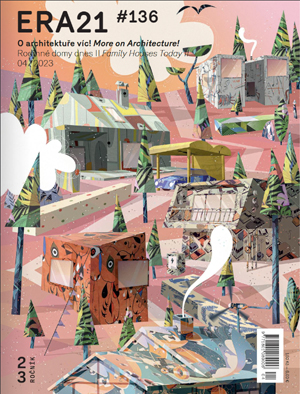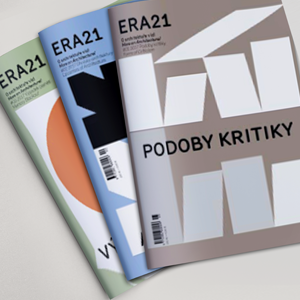Can architecture speak to us? Communication as one of the functions of architecture was the main focus of the postmodern discourse, as well as the very first Venice Architecture Biennale in 1980. We spoke of the subsequently divergent definitions of postmodernism with architect and theorist Léa‑Catherine Szacka.
» entire articleCzech architects, who had already been developing postmodern approaches in their work since the 1970s, considered the term postmodernism misleading and basically forbidden, much like many foreign architects. Whether they demonstrated postmodern strategies being consciously inspired by western architecture, or indirectly through their own exploration, remains a question. Though their postmodern approaches assumed subversive ironic meanings, they were social gestures and environmental calls, too. After 1989, also under the influence of critical regionalism, the terms new modernism, neofunctionalism, or simply functionalism—signifying an uninterrupted connection with the interwar tradition—were established to describe the work of these architects. As a result, there’s still some confusion about what should actually be considered the legacy of the Czech postmodern architectural heritage.
» entire articleJan Mach and Jan Vondrák, founders of Mjölk architecture office in Liberec, are very much influenced by the landscape around the foothills of the Jizerské Mountains and the Ještěd Ridge. They attended university there, and they still live and work there today. Their long term focus on architectural interventions in nature was predetermined by the surrounding setting. As a result, they built several lookout structures on nearby hilltops. In our interview, we discussed the ways in which architecture should enter open landscapes, how we should react when these structures cause controversy, and how generosity and joy are essential parts of the job.
» entire articleWhen we first asked the “first lady” of Czech architecture for a “family” interview about architecture we were decidedly rejected. Apparently they didn’t talk about architecture at home. But after a few long phone calls and careful explanations, one Saturday evening we finally met - professor Alena Šrámková, her daughter Magdalena Hlaváčková and granddaughter Magdalena Hlaváčková jr. – in their house in Jenštejn, and we talked about passing on the architectural profession from generation to generation.
» entire articleThere is still some confusion surrounding the term postmodern architecture, especially as to which architectural legacy it actually references. Roots of the movement—originally critical of ossified modernist dogmas, opposing the fashionable brutalist wave—date back to the first manifestos of the 1960s, but it was through Charles Jencks’ theoretical agenda that it later established itself under the name postmodernism...
» entire article

ERA21 vydává ERA Média, s. r. o. |
|
|
Phone: +420 530 500 801 E-mail: redakce@era21.cz |
|
| WEBdesign Kangaroo group, a.s. |